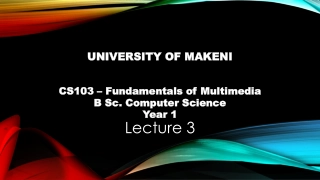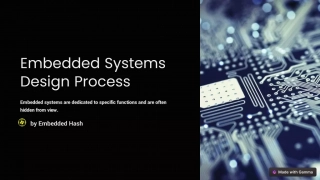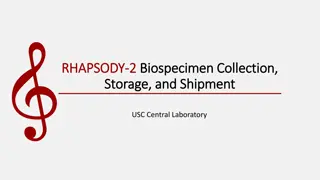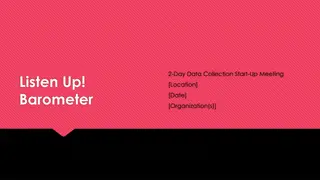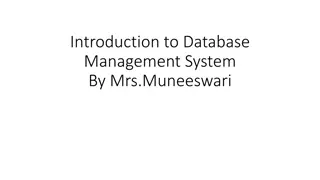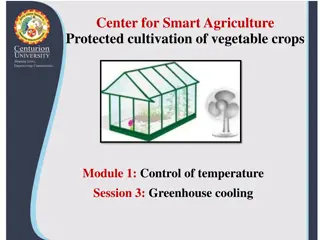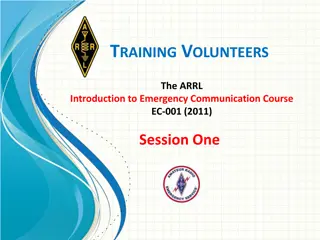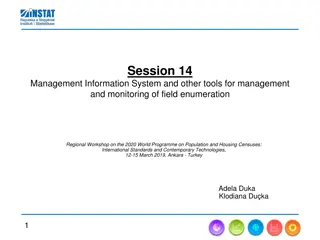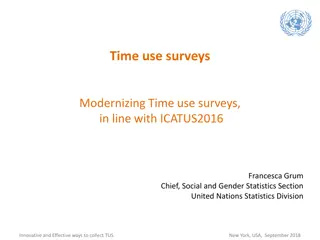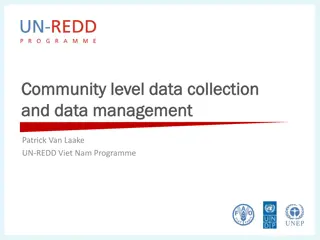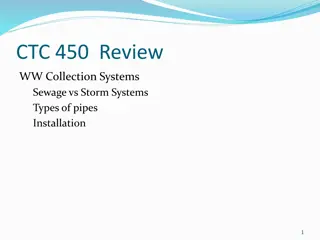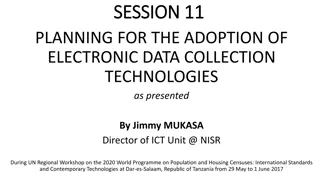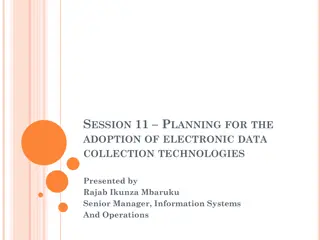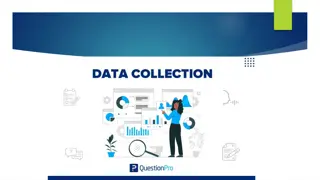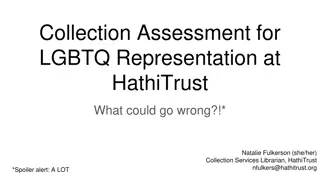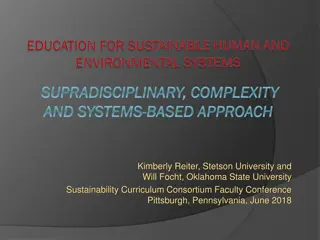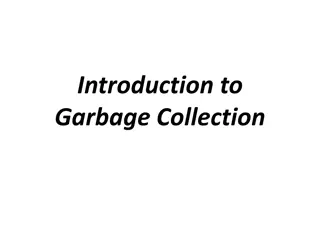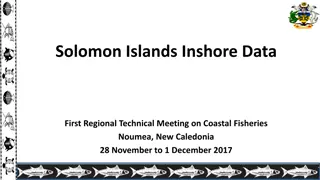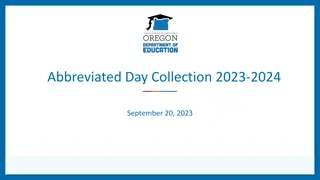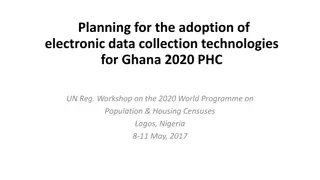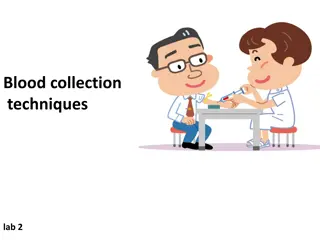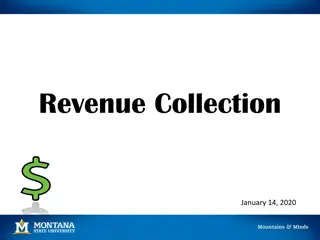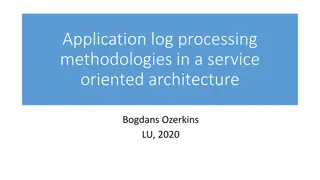Understanding Multimedia Systems: Hardware and Software Components
Multimedia systems require specific hardware and software components to meet the demands of producing and playing multimedia content. Development systems are used for creating content with higher specifications, while playback systems are used for playing multimedia files with lower specifications.
8 views • 46 slides
Embedded Systems Design Process in the Embedded systems
Embedded systems are all around us, from the tiny microcontrollers in our household appliances to the sophisticated control systems in cars and aeroplanes. But how are these systems designed? Let's delve into the basics of the embedded systems design process in simple terms that anyone can understan
2 views • 9 slides
Biospecimen Collection, Storage, and Shipment Overview at USC Central Laboratory
This overview covers the types of biospecimens collected, specimen collection schedule, supplies, protocols, and shipping instructions at the USC Central Laboratory. It includes details on whole blood collection for different assays, storage procedures, and shipment to USC Labs and Charles River Lab
0 views • 21 slides
Practical Bacteriology Laboratory Diagnosis and Sample Collection
This practical guide focuses on laboratory diagnosis steps in bacteriology, covering specimen collection, microscopic examination, culture tests, biochemical tests, serological tests, and molecular tests. Learn about various sample collection methods for urine, stool, swabs, sputum, pus, CSF, and mo
3 views • 23 slides
Overview of Distributed Systems: Characteristics, Classification, Computation, Communication, and Fault Models
Characterizing Distributed Systems: Multiple autonomous computers with CPUs, memory, storage, and I/O paths, interconnected geographically, shared state, global invariants. Classifying Distributed Systems: Based on synchrony, communication medium, fault models like crash and Byzantine failures. Comp
9 views • 126 slides
Operating Systems
An operating system is a crucial program that manages all other programs on a computer. It handles tasks like input recognition, file management, and device control. There are different types of operating systems such as single-user, single-task systems, multi-user, multi-task systems, real-time ope
6 views • 11 slides
Understanding Information Systems in Organizational Management
Management in organizations is divided into three levels: operational, tactical, and strategic. Each level requires different information systems to support various activities. Operational systems focus on routine transactions and control processes, while middle-level systems aid in semi-structured
9 views • 39 slides
Listen Up! 2-Day Data Collection Start-Up Meeting Overview
A comprehensive overview of the 2-day data collection start-up meeting for the Listen Up! project and Barometer. The meeting aims to equip participants with an understanding of project goals, data collection tools, feminist principles, and humanitarian response measures. Topics covered include core
0 views • 56 slides
Introduction to Database Management System Explained
This presentation covers the basics of database management systems, including definitions of data, types of data, structured and unstructured data, storing data in computers using file systems and database systems, and issues with file systems like data redundancy, inconsistency, difficult data acce
1 views • 18 slides
Understanding Different Types of Recommender Systems
Recommender systems play a crucial role in providing personalized recommendations to users. This article delves into various types of recommender systems including Collaborative Filtering, Content-Based, Knowledge-Based, and Group Recommender Systems. Collaborative Filtering involves making predicti
0 views • 7 slides
Efficient Greenhouse Cooling Systems for Smart Agriculture
Active summer cooling systems like fan-and-pad and fog systems are crucial for maintaining optimal temperatures in greenhouses. These systems work by utilizing evaporation to remove heat from the air. Fan-and-pad cooling systems have been in use since 1954, where water is passed through pads to cool
1 views • 23 slides
Understanding Emergency Communication Systems for Volunteer Training
This content covers various topics related to emergency communication systems for volunteer training, including agency communication systems, government radio systems for police and fire departments, emergency medical radio systems, American Red Cross frequencies, and types of served-agency radio sy
2 views • 29 slides
Introduction to Embedded Systems Design
Embedded Systems Design, Chapter 1 provides an insightful overview of embedded systems, distinguishing them from general-purpose computers. The chapter delves into the characteristics of embedded systems, their design considerations, and the various types of embedded computers such as general-purpos
1 views • 7 slides
Effective Management Systems for Field Enumeration in Population and Housing Censuses
Management Information Systems and tools play a crucial role in monitoring and managing field enumeration activities during population and housing censuses. Real-time monitoring of enumeration status, quality control measures, and data transmission to headquarters are essential for a successful enum
0 views • 13 slides
Modernizing Time Use Surveys: Innovative Approaches for Efficient Data Collection
Explore innovative ways to modernize time use surveys for efficient data collection, addressing challenges like high respondent burden and low response rates. The article covers cost-effective methods, instrument requirements, data collection modes, and optimizing inputs and outputs. Various survey
0 views • 12 slides
Community-Based Data Collection and Forest Management for REDD+ Initiatives
Participatory approaches in forest management by local communities have shown success in conservation efforts. Ownership, long-term commitment, and social pressures play key roles. Additionally, secondary uses of the forest, carbon assessment by communities, supplementary data collection, and effici
0 views • 12 slides
Overview of Wastewater Collection and Treatment Systems
Explore the evolution of wastewater treatment processes, from Imhoff tanks to activated sludge systems. Learn about the history of sewage and stormwater collection, different types of pipes used, installation methods, and the importance of designing systems to combat diseases. Discover how processes
0 views • 46 slides
Understanding Data Collection and Analysis for Businesses
Explore the impact and role of data utilization in organizations through the investigation of data collection methods, data quality, decision-making processes, reliability of collection methods, factors affecting data quality, and privacy considerations. Two scenarios are presented: data collection
1 views • 24 slides
Waste Collection Systems Overview and Best Practices
Waste collection systems can be classified as manual or mechanical based on the type of collection vehicle used. Residential waste loading methods include direct lifting, rolling of containers, and use of lifts. Commercial and industrial services typically utilize large mobile or stationary containe
0 views • 7 slides
Comprehensive Collection and Foreclosure Update by Michael R. Vieira, Esq.
As discussed by Michael R. Vieira, Esq. from Ashford & Wriston LLP, this collection and foreclosure update covers crucial aspects such as collections 101, decision-making processes, lawsuit timelines, judgment collection strategies, service member protections, common arguments, and more. The informa
0 views • 88 slides
Data Collection on COVID and Disability by Washington Group
The Washington Group on Disability Statistics conducts data collection activities related to COVID and disability through annual country reports. These reports include information on recent and planned data collection efforts, surveys and censuses on disability, administrative records, and specific
0 views • 13 slides
Adoption of Electronic Data Collection Technologies in Population Census Planning
Presentation by Jimmy Mukasa at a UN Regional Workshop focusing on the adoption of electronic data collection technologies for the 2020 World Programme on Population and Housing Censuses. The discussion includes past experiences, future plans, advantages of using Computer-Assisted Personal Interview
0 views • 22 slides
Information Systems in Organizations: Overview and Implementation
Information systems play a crucial role in organizations, encompassing transaction processing systems, functional area information systems, and enterprise resource planning systems. This content delves into the purpose of transaction processing systems, the support provided by information systems ac
0 views • 30 slides
Modernizing Census Operations with Electronic Data Collection Technologies
Recent technological advancements have revolutionized census processes, enhancing the efficiency and accuracy of data collection. This session delves into the strategic considerations for adopting electronic devices and mobile data capture in census operations. Insights from past experiences in Keny
0 views • 18 slides
Back to School Training: WISEstaff DPI Product Team Session
Review best practices for staff data collection, getting ready for the upcoming collection year, adding Entity IDs for licensed assignments, tracking trends on Data Quality Dashboard, system notifications, and seeking help with WISEstaff and licensing questions. Learn about WISEstaff application use
0 views • 22 slides
Understanding Data Collection Methods for Business Analysis
Data collection is essential for analyzing business performance and making informed decisions. Various data collection methods like primary and secondary data collection help evaluate outcomes and draw conclusions. Primary data includes raw information obtained firsthand, while quantitative methods
0 views • 15 slides
LGBTQ Collection Assessment at HathiTrust
HathiTrust aims to make intentional collection decisions and address historic inequities regarding LGBTQ representation. The evaluation involves preserving queer and trans history, serving LGBTQ patrons better, and exploring research questions. They review literature, investigate collection models,
0 views • 10 slides
Overview of WEEE Collection in Baltic States
This presentation explores the WEEE (Waste Electrical and Electronic Equipment) collection practices in Estonia, Latvia, and Lithuania. It covers the targets set by the WEEE directive 2012/19/EU, the setup of collection systems, and the results achieved. The content delves into the minimum collectio
0 views • 19 slides
Understanding Cascade Control Systems in Industrial Processes
Cascade control systems play a crucial role in improving process control efficiency by incorporating feedback loops within feedback loops. This type of control architecture helps to better handle disturbances and variations in the process by creating secondary loops that monitor specific parameters.
0 views • 8 slides
Sustainable Education for Human and Environmental Systems
Sustainable Education for Human and Environmental Systems (SHES) focuses on fostering sustainable societies through social learning and systems thinking. It aims to promote interconnectedness between human and environmental systems, with a vision of enhancing well-being while maintaining the viabili
0 views • 19 slides
Understanding Garbage Collection in Programming
Garbage collection automates memory reclamation, freeing programmers from manual memory deallocation tasks. This process enhances program reliability, reduces errors, and decouples memory management from other software engineering concerns. Originating in LISP in 1960, garbage collection has become
0 views • 25 slides
Challenges and Strategies in Solid Waste Collection in Urban Areas
Solid waste collection in urban areas is complex due to the diffuse nature of waste generation, varied collection locations, increased quantities of waste, high costs, and the need for continuous service. Different collection methods and systems such as curbside pick-up, alley service, set-out set-b
0 views • 5 slides
Analysis of Data Collection Practices for Interpersonal Violence Services in Peel
The Peel Institute on Violence Prevention conducted a pilot study in May 2015 to identify gaps in data collection practices of health, justice, and social service agencies serving survivors of interpersonal violence in the Peel region. The study aimed to understand service availability, standardize
0 views • 38 slides
Insights into Data Collection and Fisheries Management in Solomon Islands Inshore Fisheries
Through a comprehensive overview of data collection methods and types related to inshore fisheries in the Solomon Islands, this report highlights various aspects such as marine product export and local purchase data, HAPIFIS data collection with socio-economic surveys, and research on key species li
0 views • 16 slides
Abbreviated Day Collection 2023-2024 Overview
Providing essential information about the Abbreviated Day Collection 2023-2024, this collection aims to gather student level records for those on an Abbreviated School Day Program. It serves to aid in tracking and monitoring per SB 819 guidelines, offering valuable guidance and technical support. Di
0 views • 34 slides
Understanding Embedded Systems and Cyber-Physical Systems
Embedded systems are specialized computer systems embedded within larger systems, such as control systems and car controllers. This lecture covers real-time aspects, applications of Cyber-Physical Systems (CPS), and examples like the Boeing 777/Airbus A380 cockpit. It discusses the design process of
0 views • 22 slides
Adoption of Electronic Data Collection Technologies for Ghana's Population Census
The adoption of electronic data collection technologies in Ghana for the 2020 Population and Housing Census has brought significant improvements over traditional methods. This transition process aims to streamline data collection, analysis, and dissemination, reducing time lags and improving the qua
0 views • 13 slides
Comprehensive Guide to Blood Collection Techniques in Medical Investigations
Blood collection is a crucial process in medical investigations where blood is withdrawn from patients for analysis. Methods include arterial sampling, venipuncture, and fingerstick sampling, each serving specific purposes. Venous blood is preferred over arterial blood due to accessibility and ease
0 views • 10 slides
Revenue Collection and Controls Overview
This document provides insights into revenue collection procedures, risks associated with revenue collection such as skimming, controls to prevent fraud, segregation of duties, and key controls for revenue collection. It emphasizes the importance of proper procedures, staff separation, and diligent
0 views • 34 slides
Application Log Processing Methodologies in Service-Oriented Architecture
Understanding the methodologies for processing application logs in a service-oriented architecture, including data collection, purpose, programming language toolkits, centralized log collection, non-discardable logs collection, event/enterprise bus integration, cloud platform data collection, and Ku
0 views • 13 slides
